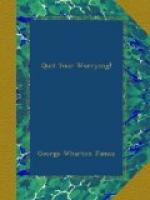Here was a simple and practical remedy, and I found it worked well. But I can now see that there was a much better way. Where good is substituted for evil one has “the perfect way,” and the Apostle Paul revealed himself a wise man of practical affairs, when he urged his readers to “think on the things” that are lovely, pure, just, and of good report. In my case I merely sought to prevent mental vacuity so that the seven devils of worry could not rush into, and take possession of, my empty mind; but I was indifferent, somewhat, to the kind of thought or mental occupation that was to keep out the thoughts of worry. A Nick Carter detective story was as good as a Browning poem, and sometimes better; a cheap and absurd show than an uplifting lecture or concert. How much better it would have been could I have had my mind so thoroughly under control—and this control can surely be gained by any and every man, woman, and child that lives,—that, when worrying thoughts obtruded, I could have said immediately and with authoritative power: I will to think on this thing, or that, or the other. The result would have been an immediate and perfect cessation of the worry that disturbed, fretted, and destroyed, for the mind would have become engaged with something that was beneficial and helpful. And remember this: God is good, and it is His pleasure to help those who are seeking to help themselves. Or to put it in a way that even our agnostic friends can receive, Nature is on the side of the man or woman who is seeking to live naturally, that is, rightly. Hence, substitute good thoughts for the worrying thoughts and the latter will fade away as do the mist and fog before the morning sun.
Here, then, I had clearly demonstrated for myself the needlessness of worry: I could prevent it if I would. And my readers cannot too soon gain this positive assurance. They can, if they will. It is simply a question of wanting to be free earnestly enough to work for freedom. Is freedom from worry worth while; is it worth struggling for? To me, it is one of the great blessings of life that worry is largely, if not entirely, eliminated. I would not go back to the old worrying days for all the wealth of Morgan, Rockefeller, and Carnegie combined.
As for the uselessness of worry; who is there, that has studied the action of worry, that ever found any of the problems it was concerned over improved by all the hours of worry devoted to it. Worry never solved a problem yet; worry muddies the water still further instead of clearing it; worry adds to the tangle instead of releasing it; worry beclouds the mind, prevents sane judgment, confuses the reason, and leads one to decisions that never ought to be made, and so to an uncertainty, as vexatious and irritating as is the original problem to be solved. If the worry pointed a way out of the difficulty I would extol worry and regard it as a bitter draught of medicine, to be swallowed in a hurry, but producing a beneficial result. But it never does anything to help; it invariably hinders; it sets one chasing shadows, produces ignes fatui before the eyes, and ultimately leads one into the bog.




